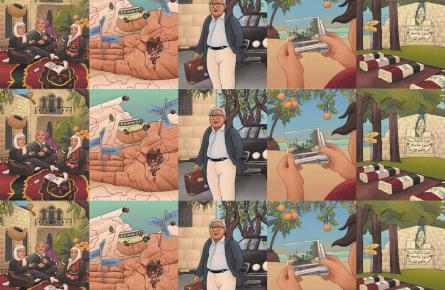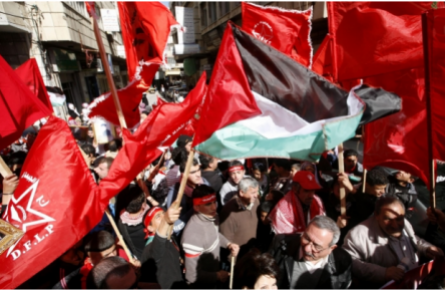For Palestinian farmers, the olive tree symbolize their heritage toiling on the land. Their future, however, is threatened by Israel. Harvest Peace offers a new approach to greening Palestine by inviting people to support the cause of repairing the soil.
The balance of power has never been more lopsided between Israel and the occupied Palestinians than it is now. Israel’s current leadership is increasingly hostile toward Palestinian statehood and the so-called “peace process” is divorced from the lives of ordinary Palestinians struggling to remain on their land. More than ever before, Palestinians need a chance to build fruitful and prosperous lives to enable them to remain on the land of a would-be state.
Into this reality steps Palestinian-American Jenny Farhat, the founder of Harvest Peace. The daughter of a father born in Ramallah whose roots reach back more than 300 years, Jenny grew up in Florida around “a large group of tight-knit Palestinian families,” she says, “and although we’re in a different country, many cultural attributes and traditions have carried over.” One such tradition is breaking bread over a plate of olive oil. According to Farhat, “olive trees are deeply rooted in the culture, history, and identity of Palestine.”
For Palestinian farmers, the olive tree symbolize their heritage toiling on the land. Their future, however, is threatened by Israel’s land grabs for illegal settlement building and the subsequent destruction of ancient olive orchards. Since 1967, Israel has uprooted over 800,000 Palestinian olive trees. In early February, Israeli human rights organization B’Tselem reported that 1,000 olive trees were uprooted to build an Israeli road connecting settlements. And every year settlers burn and cut down hundreds of Palestinian olive trees in the cruel hope of depriving farmers of their sustenance and heritage will induce them to leave their lands altogether.

This two-pronged assault had caused enormous losses for the approximately 100,000 Palestinian families whose livelihood depends on the olive harvest. The threat to olive production, which comprises nearly half of Palestinian arable land, reflects a general decline in food self-sufficiency for Palestinians. Moreover, according to a Human Rights Watch report, numerous Palestinian children have been exploited on settlement farms that were stolen from the very Palestinian families who must now send their children to work as farm hands on their ancestral properties.
 This bleak reality led Farhat to found Harvest Peace: to support Palestinians to maintain maintain their land and traditional livelihoods. The project will bring Palestinian olive oil to U.S. and Canadian markets through a fair trade campaign that offers Palestinian farmers fair compensation and donates “a portion of the proceeds of every bottle sold…to replanting olive trees destroyed” to make way for illegal settlements.” Harvest Peace has teamed up with the Palestine-based Canaan Fair Trade and the Palestine Fair Trade Association to ensure that the olive oil is certified organic and that workers are treated properly. Farhat had long been interested in permaculture and a commitment to “healing the land.” She is determined “to do something to help those affected by” the despoiling of their land. She knows first-hand the struggles of Palestinian farmers and the central role of olive trees in their lives. “I grew up hearing stories about the dinners and weddings that took place under the olive trees on my family’s land in Ramallah.” she recalls. The initial batch of Harvest Peace olive oil will be sourced from family-owned orchards in Jenin.
This bleak reality led Farhat to found Harvest Peace: to support Palestinians to maintain maintain their land and traditional livelihoods. The project will bring Palestinian olive oil to U.S. and Canadian markets through a fair trade campaign that offers Palestinian farmers fair compensation and donates “a portion of the proceeds of every bottle sold…to replanting olive trees destroyed” to make way for illegal settlements.” Harvest Peace has teamed up with the Palestine-based Canaan Fair Trade and the Palestine Fair Trade Association to ensure that the olive oil is certified organic and that workers are treated properly. Farhat had long been interested in permaculture and a commitment to “healing the land.” She is determined “to do something to help those affected by” the despoiling of their land. She knows first-hand the struggles of Palestinian farmers and the central role of olive trees in their lives. “I grew up hearing stories about the dinners and weddings that took place under the olive trees on my family’s land in Ramallah.” she recalls. The initial batch of Harvest Peace olive oil will be sourced from family-owned orchards in Jenin.
Harvest Peace needs the support of average people to raise $25,000, which is the minimum amount required to set up a viable trade network. The crowdfunding website Kickstarter has successfully launched many ventures and Farhat hopes that many will see the good in her project. Planting olive trees to replenish the destroyed stock and ensuring that trade benefits future generations would, Farhat argues, serve the goal of “reconnecting [Palestinians] to the land, creating food security” and support local economies. Moreover, “growing their own food gives the Palestinian people some leverage.” The less Israeli-substitute goods Palestinians buy, the less they’re funding their own occupation. And Palestinian olive oil on American supermarket shelves, Farhat believes, can be an effective way to introduce the Palestinian cause to American consumers. “Food brings people together,” she says, “it [creates] a time of sharing. In this case, I hope it’s also a time for educating.”
Harvest Peace presents a noble alternative to a longstanding and perfidious Israeli practice, executed by the Jewish National Fund, which stems from the myth that “Israel made the desert bloom.” Israel proudly boats about its forestation projects in historic Palestine, and invites supporters around the world to sponsor a tree. What is little known, however, is that the JNF trees are often planted on the demolished ruins of Palestinian villages to obscure Israel’s 1948 expulsion of 700,000 Palestinians. More recently, JNF has intensified its efforts to plant trees over the grazing land of Bedouin villagers forcibly relocated to make way for Jewish communities.
Harvest Peace offers a new approach to greening Palestine by inviting people to support the cause of repairing the soil.




